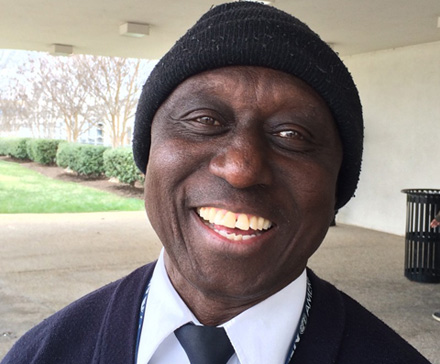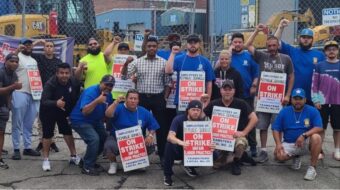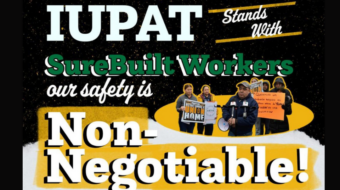
This profile is reprinted with permission from the AFL-CIO’s channel on Medium, entitled By Our Hands.
I mean, what’s it worth?
His name is Kwaku Agyeman, and he has a job pushing wheelchairs for passengers who otherwise would have a hard time getting around Reagan National Airport, which serves metropolitan Washington, DC.
If you need a wheelchair, wouldn’t you be glad to see this man? His job is to help you, which is great for you, not so much for him.
The problem is his employer, Eulen America, which has valued his job as almost worthless.
You see, Eulen America has exploited a loophole in America’s minimum wage laws. It’s a loophole you could push about a million wheelchairs through, and then follow them with an endless parade of airport skycab drivers and baggage handlers and then food service workers of all kinds. Agyeman and his colleagues earn far less than the laughably low minimum wage of $7.25 an hour. They get the other minimum wage, the tipped minimum, which is $2.17 an hour. Seriously.
With tipped workers, the employer only pays the rock-bottom minimum. The real work of deciding Agyeman’s worth is done by you. You actually decide, with your money.
It’s convenient for Eulen, because the company managers know exactly what his service is worth to Reagan National Airport. They earn millions from a contract to provide wheelchair attendants and other services to the busy transportation hub within sight of the monuments of the National Mall.
Yet somehow it’s your job to randomly and yet specifically assess Agyeman’s value by actually digging into your wallet and paying him. On your own. He’s not allowed to tell you his pay comes from your tips. You’re simply supposed to know. And to act on that knowledge.
“It’s left to the generosity of the passenger,” Agyeman said, who’s 59 and hopes somehow, someday to help his 18-year-old daughter pay for college after she graduates from high school.
His plan isn’t to wait and hope National’s passengers suddenly start showering him with bills. He wants to negotiate with his employer, Eulen America. He wants to negotiate through a union of his coworkers, who all get something south of the federal minimum wage.
What does Agyeman think his service is worth? Judging from the value of contracts of companies like Eulen and from the wins of airport workers in places like New York City, it looks like $15 an hour is reasonable. That’s what he and his coworkers want. That’s what they’re asking for as members of 32BJ, which is part of the Service Employees International Union. The “BJ” stands for Building Janitors. It’s the biggest union of property services workers in the United States.
Agyeman hopes his job is valuable enough that someday he’d be able to quit his other job and eventually maybe even retire. He also hopes to buy a home. Something.
Today, though, he shrugs his shoulders and adjusts his tie. He’s getting ready to push a traveler from the parking lot through to check-in, security and the gate. It’s what he does. But what’s it worth?










